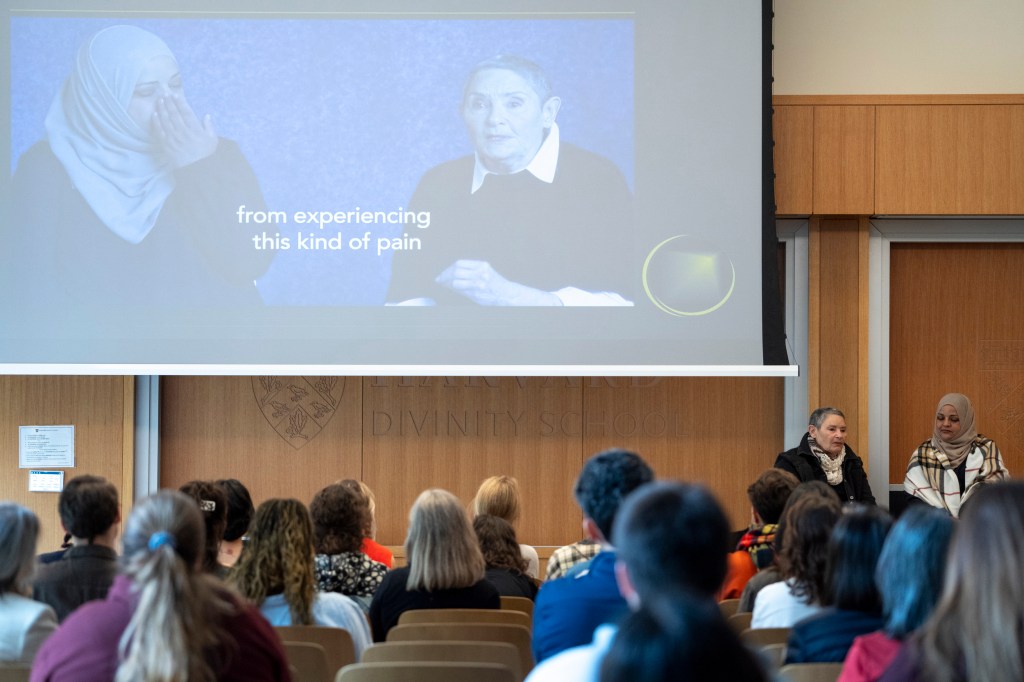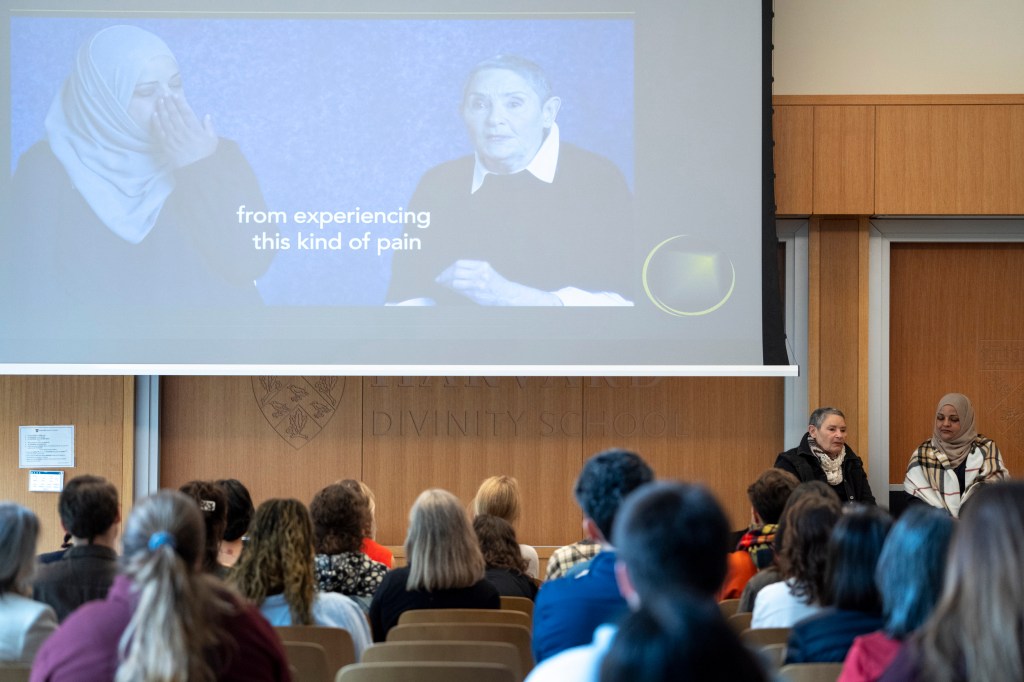Layla Alsheikh and Robi Damelin know the never-ending pain of losing a child.
Each had a son who died in the decadeslong deadly conflict between their communities in the Middle East. Through intention and a long process of healing, these women are now friends and travel the world advocating for peace, a mission made more urgent by the current fighting. The two spoke during a Harvard Divinity School event Monday.
“Today, we are privileged to have with us two people — one Israeli and one Palestinian — who are willing to share with us their experiences of loss so that we might be reminded of what is truly at stake at war and how none of us wins,” Marla Frederick, dean of the Divinity School and John Lord O’Brian Professor of Divinity, said during the discussion.
Alsheikh’s 6-month-old died of complications following a teargas attack on their village by Israeli forces in 2002. Damelin’s 24-year-old son David, a member of the peace movement, was killed by a Palestinian sniper during his mandated military service in the Israeli armed forces that same year.
The losses remain profound and fresh.
“Every time [I thought about what happened] I felt there’s a piece of my heart and my soul under the ground,” Alsheikh said. “It was so hard for me.”
“There’s nothing worse than losing a child,” Damelin said. “Somebody comes and slashes your heart, and it’ll never be the same.”
For both Damelin and Alsheikh, there’s been a desire to untangle the longstanding hate and pain of both sides of the conflict. Empathy has been key.
“I’ve spent such a lot of my life trying to understand why,” Damelin said at the discussion, done in partnership with American Friends of the Parents Circle — Families Forum (PCFF). “Why a young man who grows up in Gaza could do the things he did on the 7th of October?”
Sixteen years after her son died, Alsheikh was approached by a friend who wanted her to attend a meeting of PCFF, an Israeli-Palestinian nonprofit group of bereaved families seeking reconciliation instead of revenge by modeling constructive dialogue.
At the meeting she connected with the other Palestinian women, but still felt distrustful of the Israeli families there, all of whom had lost a close loved one. She decided to share her story with the group.
“Please don’t pro-Israel and please don’t pro-Palestine: pro-peace. This is what we need.”
Layla Alsheikh

When she broke down in tears, an Israeli woman stood up, apologized, and said, “I didn’t hurt you, but the people who hurt you are from my own people. I’m a mother too. I can understand your pain.” The women embraced.
“That was the first time I thought someone cared about me or could understand me,” Alsheikh said.
She continued to work with the organization and share their message of reconciliation. But it’s been a hard road.
A few years ago, an Israeli man in one of her meetings shared that he had been an officer in the army in the region where she lost her son.
At the time, he routinely stopped Palestinian families from receiving medical care — an experience Alsheikh had while caring for her son. It wasn’t until his own child became sick and he was stopped by guards that he realized the pain he had caused other families.
He quit the military, was jailed for refusing to serve, and eventually founded a nonprofit where former combatants from both sides work together for peace.
“I looked at him and I said, ‘This is so hard for me to listen to you. But at the same time, I want to thank you. Because if you hide that part of your story, I will never forgive you,’” she said. “‘But I will forgive you, because you have the courage and honesty to speak in front of me.’”
That was a major moment of reconciliation for her.
Damelin agreed that peace work is painful. But she also believes that preventing other people from experiencing the kind ofloss she has is worth it.
“One of the first things that I said [when David was killed was], ‘You can’t kill anybody in the name of my child,’” she said.
Years after her son was killed, three soldiers knocked on her door. They told her that they had caught the man who killed her son. She didn’t sleep for months.
“You can go around the world talking about peace just like I did … But then there’s a case that comes along [that tests you],” she said. “I couldn’t do this work in integrity if I wasn’t willing to walk the talk.”
She decided to write a letter to the man’s family, telling of her son David, the pain of her loss, but also of her desire to reconcile. She had the letter delivered by Palestinian friends.
Named a 2015 Woman of Impact by Women in the World, Damelin has continued to travel globally advocating for reconciliation and peace on behalf of the PCFF.
Recently, the group partnered with Georgetown University to create an online dialogue program called Listening from the Heart, which provides tools for participants and facilitators to talk about the Israeli-Palestinian conflict and its complexity.
At the end of the event, Teddy Hickman-Maynard, associate dean for Ministry Studies, asked the two women if they had any final thoughts for the community.
“Please don’t pro-Israel and please don’t pro-Palestine: pro-peace. This is what we need,” Alsheikh said. “If you fight all the time, that won’t help us in any way. But if you are pro-peace, that will help us more than you think.”
Source link

